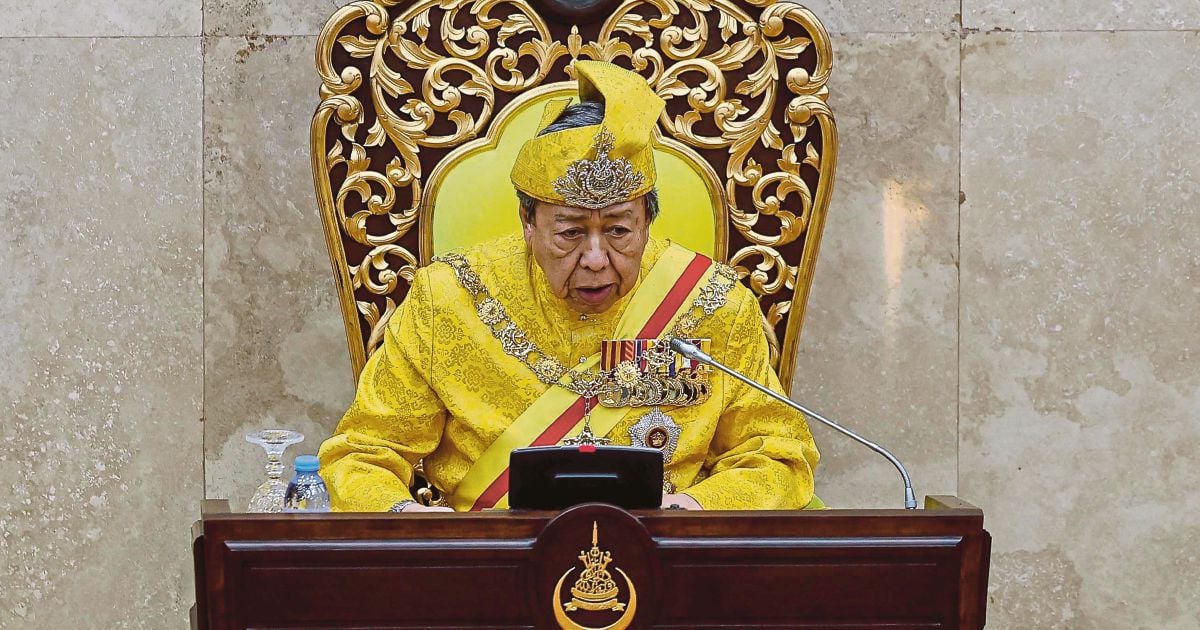SHAH ALAM: Selangor ruler Sultan Sharafuddin Idris Shah has warned against the recurrence of illegal land ownership transfers and the mismanagement of business licences in the state.
“To government officials and civil servants in Selangor, particularly those at district offices and local authorities, carry out your duties responsibly and avoid corruption and malpractice,” Sultan Sharafuddin said in his royal address at the Selangor State Legislative Assembly yesterday.
“I do not want to hear any more about land ownership and business licence mismanagement for personal gain.”
In January, police uncovered illegal land transfers involving insiders at the Klang Land and District Office, resulting in the arrests of 17 people. The suspects are believed to be part of a cartel that had illegally transferred 9.4ha of land worth RM7.1 million.
In his address at the opening of the first meeting of the third session of the 15th Selangor State Legislative Assembly, Sultan Sharafuddin said department heads must ensure that no abuses of power occur under their watch.
On development in the state, he said programmes benefiting the people must be prioritised.
“I wish to see my government and the Selangor public service carry out their responsibilities with full integrity, efficiency and competitiveness.”
He called on assemblymen to focus on issues important to the people and the state.
He reminded elected representatives to steer clear of trivial matters and disrespectful remarks.
“State assembly meetings should be conducted with decorum and should not become a platform for spreading slander and insults.
“The people are watching and evaluating their elected representatives’ every move. I wish all Selangor assemblymen a successful session.”
State executive councillors said the sultan’s decree to the public service to uphold integrity and prioritise the future and wellbeing of the state and its people must be adhered to.
State Local Government and Tourism Committee chairman Datuk Ng Suee Lim said politicians, assemblymen and executives must not disappoint Sultan Sharafuddin, who placed great trust in them to uphold Selangor’s good name.
“I fully support the Sultan of Selangor’s decree. It is a serious reminder to all of us of our responsibility to the people and the state, particularly in light of the alleged corruption at the District and Land Office.
“We do not want irresponsible parties to tarnish the state’s reputation. So, it is crucial to adhere to good values and keep the sultan’s decree in mind in everything we do.
“We aspire for Selangor to be a model for others. Thus, we must eliminate negative elements.”
State Human Resources and Poverty Eradication Committee chairman V. Papparaidu said Sultan Sharafuddin’s decree should not be taken lightly.
“He specifically mentioned local authorities and the District and Land Office. His message was clear — there must be no more corruption.
“This is a stern warning and I wholeheartedly welcome it, as it applies not only to the civil service, but to politicians as well.
“The sultan wants everyone to work together for the betterment of the state and we must set aside political differences, race and religion to achieve this.”
State Rural Development, Unity and Consumerism Committee chairman Datuk Rizam Ismail said although the sultan’s decree was directed at local authorities and the District and Land Office, it also applied to him as an elected representative.
“Integrity, transparency and trust in carrying out duties are fundamental. As trustees of the people, we must ensure every action and decision we make serves the interests of the state and the wellbeing of its people.
“This includes rejecting corruption, abuse of power and ensuring efficient and effective administration.”
State Women Development and Community Welfare Committee chairman Anfaal Saari urged elected representatives to serve the people and focus on programmes that benefit them, while carrying out their responsibilities with integrity and efficiency.
“We must constantly evaluate the effectiveness of programmes for the people to ensure they meet their needs. Aid programmes should be reassessed for their effectiveness and sustainability.
“To achieve this, we have started gathering input through a Welfare Colloquium to rethink the implementation of the Bingkas Selangor aid, in collaboration with experts from Universiti Malaya and Universiti Teknologi Mara.
“Another initiative is the Senior Citizens Policy Framework Analysis Project, which will re-examine the implementation of assistance for the elderly, including the Age Friendly Scheme, in collaboration with experts from Universiti Putra Malaysia and Universiti Pertahanan Nasional Malaysia.”
© New Straits Times Press (M) Bhd

